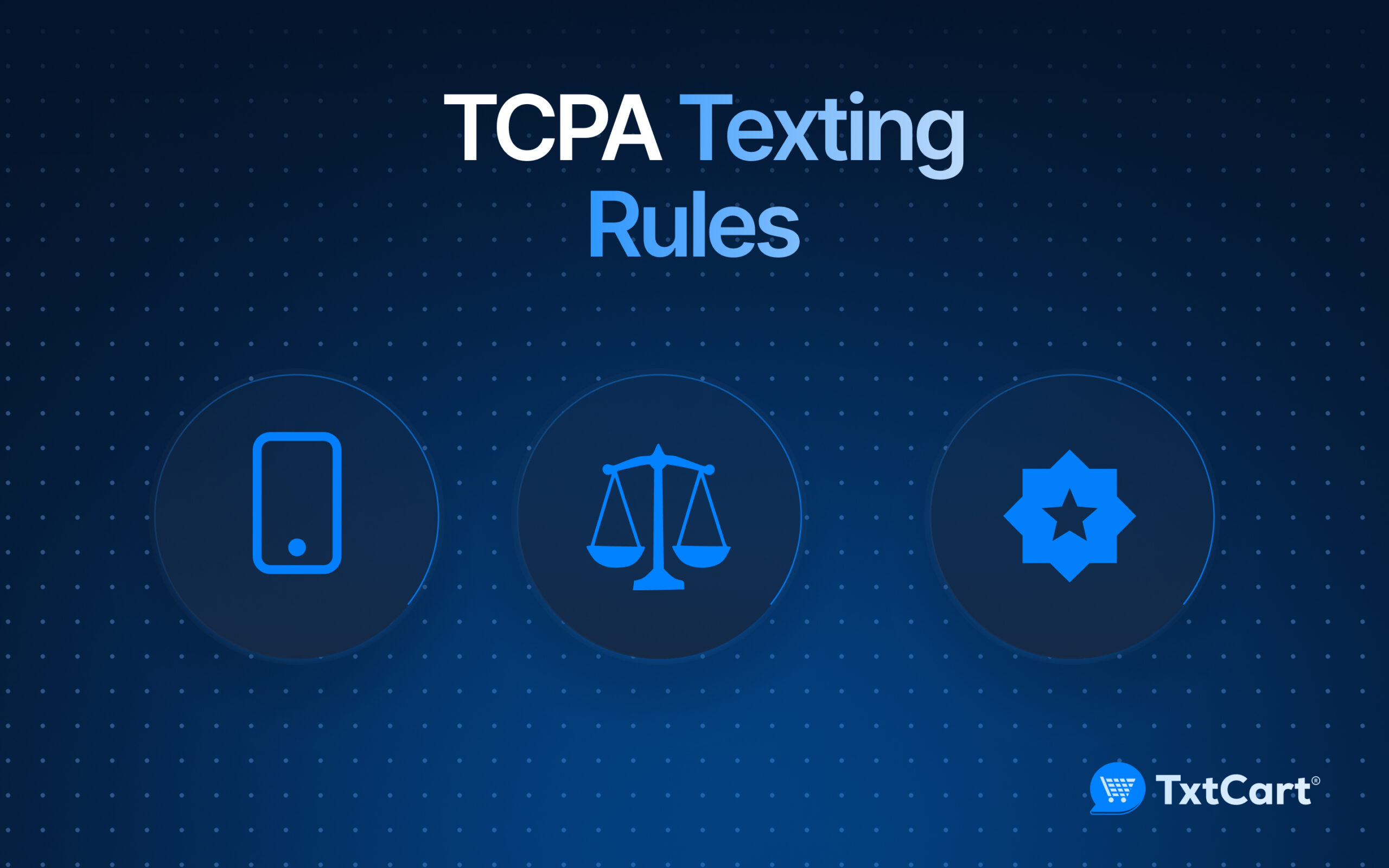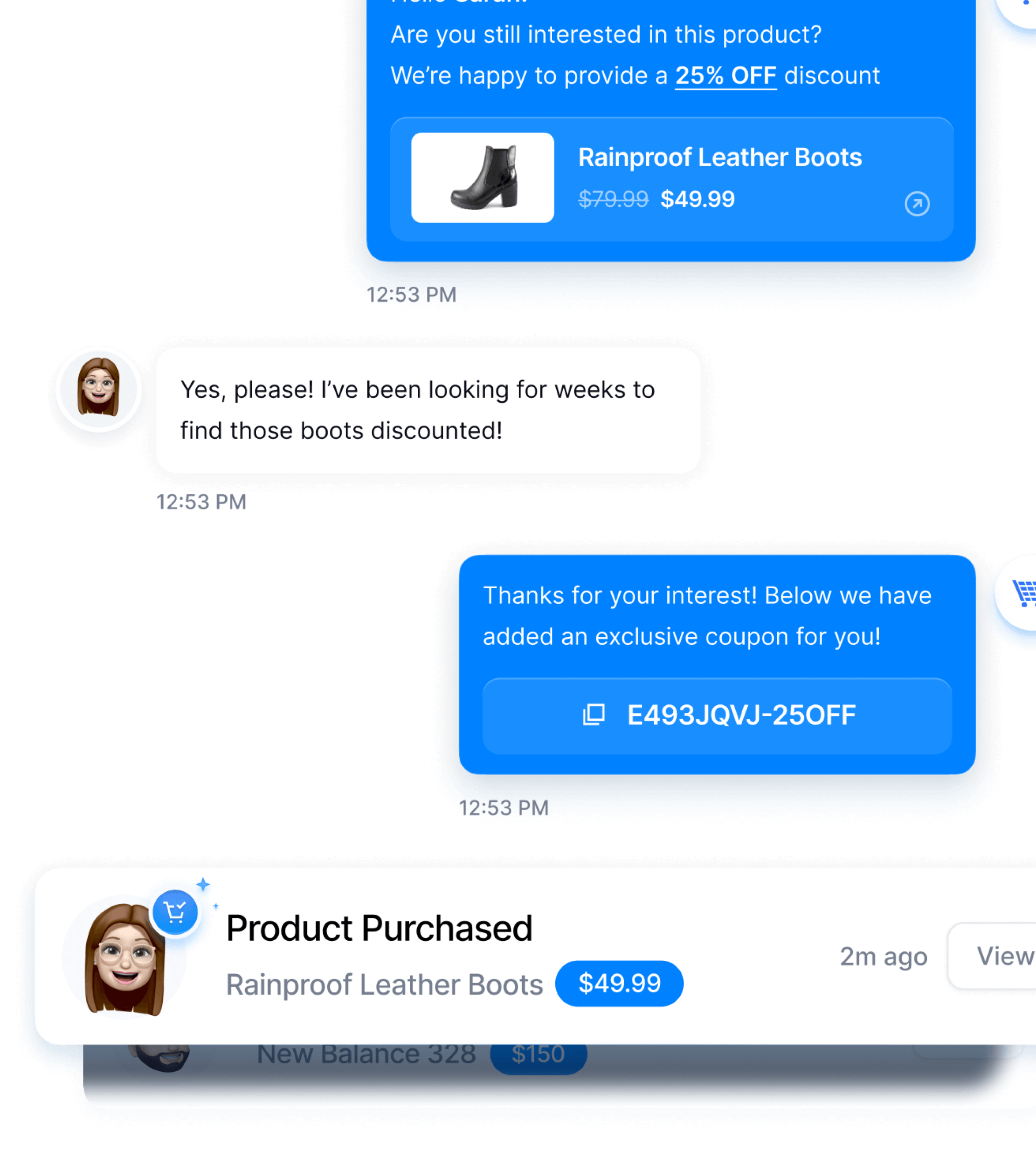With great open rates and minimal cost, SMS marketing can be an extremely beneficial method for reaching customers. It unlocks a lot of potential for your brand in improving the scope and impact of your marketing.
However, it is very important for your business to ensure that your SMS marketing campaign stays compliant with the laws and will not violate any regulations, which might bring additional fines and penalties to your brand.
To help you prevent this we decided to arm you with all that you need for SMS marketing compliance. Here is our detailed guide on the TCPA compliance checklist 2024.
What is TCPA?
TCPA or Telephone Consumer Protection Act is a U.S. federal law, which was first signed in 1991.
The goal of TCPA is to regulate telemarketing and to protect consumers from unwanted, unexpected phone calls, auto-dialed calls, pre recorded calls, text messages, and unsolicited fax messages from organizations or brands, that are sent without the user’s consent.
One of the most important requirements under TCPA for marketers is the Prior Express Written Consent (PEWC). This should be obtained by any brand if they are to send out marketing content to users using ATDS or an Automated Telephone Dialing System.
In 2024, TCPA has undergone significant amendments such as the requirement of individualized consent for automated marketing messages, do-not-text provision, encouragement on using opt-in services for email-to-text conversions and more.
In the context of SMS marketing, TCPA has rules and requirements that need to be followed by businesses when sending marketing text messages. It is advised to follow TCPA’s best practices for ensuring that your brand adheres to SMS marketing compliance rules. Here are a few best practices to keep in mind:
- Gain consent for marketing messages through opt-in messages.
- Obtain consent for non-marketing communications as well.
- Protect your brand from litigations by tracking and backing up a record of consumers who have provided consent, along with the type of communication customers have consented to.
- Offer a clear opt-out option to customers.
- Check the do-not-text list frequently.
- Scrub your data and lists to check for litigators.
- Check your pre-recorded scripts frequently to see if the messages include a phone number for “do not call” requests, automated interactive voice or an opt-out mechanism operated by key-press, as well as company identification and purpose disclosure.
Understanding TCPA Requirements
The objective of TCPA is to protect customers from receiving unsolicited messages, calls and advertisements.
TCPA texting rules include obtaining prior express written consent from recipients for sending promotional messages, giving opt-out mechanisms, and complying with other restrictions and rules outlined in the TCPA to protect consumers from unwanted messaging and calls.
Obtaining consent also ensures that a business’s marketing efforts are better targeted only towards the audience that has expressed interest and is considering doing business with your brand. It is also a way of fostering trust between the brand and its customers.
Some of the key provisions of TCPA are as follows:
Calling Time Restrictions
Companies that are contacting consumers should only do so between 8;00 AM and 9:00 PM.
Robocalls
TCPA guidelines for businesses regulate businesses from the use of artificial voices or pre-recorded voices when calling residential numbers for marketing if they haven’t received written consent from the consumer.
Identification requirements
TCPA makes it compulsory for the caller to provide their name, the name of the brand, and the number that can be used to reach them again if the customers want to.
Automatic Telephone Dialing Systems
TCPA restricts autodial marketing calls or messages to consumers, where they might get charged for the communication without their written consent. It also restricts auto-dialed calls with non-marketing purposes, if the brand hasn’t gotten the customer’s PEWC.
National Do Not Call registry
Businesses should check the phone numbers in the national and state DNC registry so as to not contact these consumers.
Internal Do Not Call List
Businesses should keep an internal Do Not Call list or Do Not Text list where customers who asked not to be called or texted are included.
It should also be understood that TCPA regulations have their own set of different regulations for informational and promotional texts.
Differentiating between informational and promotional text messages is necessary to ensure that your business applies appropriate consent and compliance measures for each scenario depending on the nature of the communication.
TCPA Compliance Checklist
Having gained a proper understanding of TCPA text message compliance, it is time to learn how to avoid the hefty TCPA fines by adhering to the compliance rules. Our TCPA Compliance Checklist 2024, should cover everything that you need.
Obtaining express written consent
The TCPA requires that before you reach out to any customers, you need to have their consent first. This prior consent must be either in a digital form in an opt-in agreement, or in written form. Once your customer has consented to receive text messages, calls or other forms of communication from you, you can reach out to them. You can get their consent by employing email campaigns, eBooks, online or offline conference/seminar sign-ups, through opt-in forms on your website etc.
Maintaining accurate records
It is important that your business maintains a detailed record of consent, opt-in, and opt-out requests. Keep a record of the customers who consented to receive texts as well as what they consented to.
In case of litigations, these records and documentation will be useful for the business to demonstrate compliance.
Implementing opt-out mechanisms
Customers can easily lose interest or get frustrated at being bombarded with either solicited or unsolicited messages from businesses. And if the business does not provide an opt-out option, this frustration can triple. Besides reporting the number as spam, the customer might even file a complaint against the business. Therefore, an opt-out mechanism should be in place for your messaging campaigns, so that customers always have the option to stop receiving marketing messages from you. This can be something as simple as “Reply STOP to unsubscribe.”
Time-of-day restrictions
TCPA allows marketers to send out marketing messages only between 8:00 AM and 9:00 PM, in the recipient’s local time zone. You should not be sending texts outside of these hours unless your business belongs to a sector that falls into a list of exclusions.
Use verified numbers
TCPA requires your business to include legitimate identification on all telemarketing messages and calls. This should include the name of the caller, the name of the business and the phone number. The phone number should also be verified as legitimate. Numbers that aren’t verified might be flagged as spam, resulting in a significant drop in the impact of your marketing efforts.
Regularly updating contact lists
To reduce any errors keep updating and regularly checking your contact list. If your agents reach out to someone in the Do-not-Text list, the consumer has every right to file a complaint against you, resulting in your business being charged with penalties. For this reason, regularly reviewing your contact list is very important.
Training your staff on TCPA compliance
Another important step towards compliant and ethical conduct in business and marketing is to educate your staff about TCPA compliance. This informs them about actions that could end up incurring fines and violating the rules. By giving a more detailed understanding of the regulations across the team, there will be minimal to zero chances of any lapses in compliance from your brand.
Identifying exemptions and exceptions
When it comes to SMS marketing compliance rules, there are a few exceptions that should be understood by businesses. One of the biggest exceptions would be if a brand annually texts a person, where TCPA regulations don’t apply. FCC recognizes that in certain situations time-sensitive and emergency messages can be sent, which should not be regulated.
There are also some exceptions that are not emergency-related such as for package delivery. FCC declares any messages that are related directly to the delivery of a package, such as a message updating the estimated time of delivery or other info on the order.
It should be noted that these exceptions are text-specific and do not exempt the business as a whole from following TCPA.
Legal Consequences of Non-Compliance
Any violation of TCPA regulations can result in the business incurring significant fines and penalties. These fines can go up to $1500 per communication. For instance, if you send automated messages without the consent of the customer, a fine can be charged to you for every single message that you send without receiving consent. However, since there is no cap on statutory damages, if you repeatedly violate the regulations, the penalties can go up to a much higher figure.
To avoid TCPA compliance penalties, businesses can take the above measures that we have discussed, and ensure that they honor the customers’ privacy and time. Additionally, it is also important for businesses to stay updated on TCPA regulations and use reputable data resources.
Conclusion
It is crucial that you are up to date on the current compliance rules and TCPA regulations to make sure your brand’s SMS marketing campaigns do not incur any additional fines or penalties. These fines can get very hefty and could hinder your business in a great way, if not avoided. Having to constantly think about this is a hassle but a good platform that does it for you can be the right way to go.
TxtCart, by default, follows all the compliance guidelines and regulations, allowing you to focus on your campaigns without worrying about any of them. TxtCart, hence, can enable your business to maintain legal compliance, respect your customer’s preferences and build a positive relationship with the audience you are targeting.






